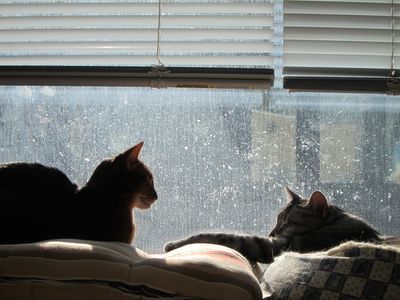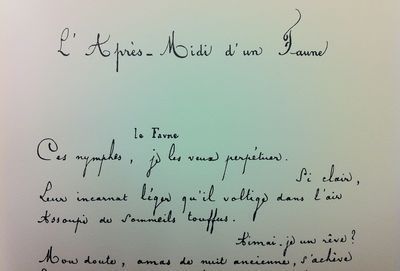Alex Ross's Blog, page 203
February 15, 2012
CD of the Week: New York Polyphony
"Mem" from Crecquillon's Lamentationes Jeremiae, from New York Polyphony's album endBeginning (BIS-SACD-1949, available 2/28; eClassical download already available).
Two fun facts about New York Polyphony baritone Christopher Dylan Herbert: in his capacity as an observer of Middle Eastern affairs, he has worked for the Defense Advanced Projects Research Agency's Integrated Crisis Early Warning System; and he is Martha Stewart's nephew.
February 14, 2012
Miscellany: Finckel, Fairouz, Philly, etc.
Something of an earthquake in the world of the perennially rock-solid Emerson String Quartet: David Finckel, the Emerson's cellist since the third year of its thirty-six-year existence, will exit at the end of the current season. Because his place will be taken by the gifted Welsh cellist Paul Watkins, no one feels great alarm. Still, it's a bit of a shock.... The Opera Company of Philadelphia, evidently bucking the trends that shuttered Opera Boston and nearly brought down New York City Opera, have announced an adventurous 2012-13 season: Britten's Owen Wingrave, Adès's Powder Her Face, and Kevin Puts's Silent Night alongside La Bohème and The Magic Flute. David Patrick Stearns has more.... On Thursday, Miller Theater presents the world premiere of Poems and Prayers, the third symphony of Mohammed Fairouz.... Juilliard's AXIOM give Rihm's Jagden und Formen a spin on Feb. 17. On Feb. 27, Jeffrey Milarsky leads the annual concert of Juilliard student composers. Both shows are free.... In coming days, the Avant Music Festival offers a centenary performance of Schoenberg's Pierrot lunaire, a rendition of Eve Beglarian's Songs from the River and Elsewhere, and a Randy Gibson piece with a really long title.... The Electronic Music Foundation present electronic works of Luigi Nono between Feb. 26 and Feb. 28.... Stucky time in NYC: the Philharmonic plays his Son et lumière Feb. 23-28, the Pittsburgh Symphony his Rachel Carson-inspired Silent Spring on Feb. 26. (The New Yorker published Carson's work just shy of fifty years ago.) ... Notable musicological tomes now in stores: Susan McClary's Desire and Pleasure in Seventeenth-Century Music, Christopher Gibbs's one-volume "college edition" of Richard Taruskin's Oxford History of Western Music.
Clipping
"One does not write, luminously, on a dark field; the alphabet of stars alone does that.... Man pursues black upon white."
— Mallarmé
Nothing says forever like an Alban Berg Valentine
DR. SCHÖN: Now — comes — the execution . . .
(While Lulu prepares for her dance number, the curtain falls.)
— Lulu, Act I
Previously: An Alban Berg Valentine, Another Alban Berg Valentine, Yet Another Alban Berg Valentine, Return of Alban Berg Valentine.
February 12, 2012
Classical music in America
The Asian-American basketball star Jeremy Lin, talking about his experiences playing on the Ivy League circuit in 2008: "I hear everything: 'Go back to China. Orchestra is on the other side of campus. Open up your eyes' . . . They're yelling at me before, during and after." (Via Andrew Patner.)
February 9, 2012
Aptest eve
In a Philip Glass column in this week's New Yorker, I say that Einstein on the Beach "shows how great art can be assembled from junk fragments of an anti-artistic society." Not coincidentally, I end with lines from Wallace Stevens's 1938 poem "The Man on the Dump." Here is the closing section:
One sits and beats an old tin can, lard pail.
One beats and beats for that which one believes.
That's what one wants to get near. Could it after all
Be merely oneself, as superior as the ear
To a crow's voice? Did the nightingale torture the ear,
Pack the heart and scratch the mind? And does the ear
Solace itself in peevish birds? Is it peace,
Is it a philosopher's honeymoon, one finds
One the dump? Is it to sit among mattresses of the dead,
Bottles, pots, shoes and grass and murmur aptest eve;
Is it to hear the blatter of grackles and say
Invisible priest; is it to eject, to pull
The day to pieces and cry stanza my stone?
Where was it one first heard of the truth? The the.
Joan Richardson, in her two-volume biography of Stevens, notes that the poet was fascinated by a trash dump near his home in Hartford, Connecticut, and took particular interest in a Russian refugee "who built a shack out of old boxes, tin cans, and bottles" and "lived there as a semihermit for several years." That image becomes a metaphor for the dilemma of the artist in the modern world. Helen Vendler, in On Extended Wings, describes the possibilities: "to sit on the dump and say 'I am sitting on a dump'; to sit and say 'This is not a dump but a garden'; to sit, see that the scene is a dump, and nevertheless say 'This dump is a flower garden.' Stevens is unwilling, as a poet, to give in to the depressing naturalism of the first; the second seems to him a romantic falsification; but he does not know quite know whether the third is possible, and hence resorts to questions...." I'd note also that when Stevens has something supremely important to say he often reduces his language to monosyllables.
What's wonderful about the conceit is that the bits of poetry that Stevens imagines being uttered on the dump — "aptest eve," "invisible priest," "stanza my stone" — are outdated, musty, redolent of some student attempt at Symbolism. Yet in conjunction with the dull matter of the scene — bottles, pots, shoes, grass — they assume sentimental power. The great poem takes in both the gutter and the stars, to adapt the famous phrase from Oscar Wilde. All this has something to do with why Einstein — an opera built from miscellaneous images, meaningless scraps of language, and jingle-like musical phrases — exerts such incalculable force. Incidentally, Stevens attended the world premiere of Virgil Thomson and Gertrude Stein's Four Saints in Three Acts, a crucial predecessor to Einstein, perhaps its only predecessor. (Mark Morris presents Four Saints at BAM in March.) To Harriet Monroe, Stevens wrote: "While this is an elaborate bit of perversity in every respect: texts, settings, choreography, it is most agreeable musically, so that, if one excludes aesthetic self-consciousness from one's attitude, the opera immediately becomes a delicate and joyous work all round." The same could be said of Einstein.
February 8, 2012
Björk in Queens
Today I dropped by the New York Hall of Science to see the set-up for Björk's Biophilia residency, which incorporates live shows, interactive technologies, and educational programs. Below, the Great Hall, with light filtering in from outside and the singing Tesla coil in action. A bit more on the project soon.
John Williams at 80
When Close Encounters of the Third Kind was released, in 1977, I was nine, and I went to see it five or six times. In retrospect, it was probably John Williams's dazzling, polystylistic score that mesmerized me most; this was my introduction to the sounds of the twentieth century. Williams deserves praise not only for writing a pile of splendid scores — Close Encounters remains, I think, his finest work — but for sustaining the tradition of orchestral film music at a time when synthesizers and pop-song montages threatened to put it out of business. As I noticed when I wrote about Michael Giacchino for The New Yorker a couple of years ago, many people in the Hollywood music community feel that Williams saved their jobs. Happy birthday!
February 7, 2012
La main du maître
Faune
Alex Ross's Blog
- Alex Ross's profile
- 425 followers










